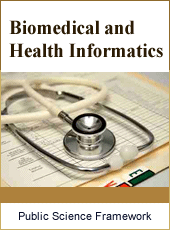Biomedical and Health Informatics
Articles Information
Biomedical and Health Informatics, Vol.2, No.1, Feb. 2017, Pub. Date: Jun. 14, 2017
Measuring Severity and Socio-demographic Characteristics of Disability in Population Based Setting, Dubai Household Health Survey 2014
Pages: 5-8 Views: 2280 Downloads: 911
[01]
Taryam M. M. O., Primary Health Care Services Sector, Dubai Health Authority, Dubai, United Arab Emirates.
[02]
Al Faisal W., Health Affairs Department, Primary Health Care Services Sector, Dubai Health Authority, Dubai, United Arab Emirates.
[03]
Hussein H. Y., Health Affairs Department, Primary Health Care Services Sector, Dubai Health Authority, Dubai, United Arab Emirates.
[04]
Suliman E. A., Dubai Health Authority, Dubai, United Arab Emirates.
[05]
Al Janahi T., Dubai Statistics Center, Dubai, United Arab Emirates.
[06]
AlSalaq A. A., Dubai Statistics Center, Dubai, United Arab Emirates.
[07]
Wasfy A. S., Dubai Health Authority, Dubai, United Arab Emirates.
Background: Disability was seen solely as the result of an individual’s inability to function. Interventions usually included medical rehabilitation and the provision of social assistance. Measuring severity of disability is not a straightforward task. Objectives: Measuring disability severity levels across groups in Dubai and identifying socio-demographic characteristics of disability in Dubai. Methodology: Dubai Household Health Survey was conducted in 2014 as a Cross-sectional, multistage, stratified, Cluster survey. Houses were visited to obtain detailed information on the different health-related issues. According to Dubai Statistical center, the total population of Dubai at the end of 2014 was 2327350 (males 1613175, females 714175) (UAE 212000, Expatriates 2115350). Individuals aged ≥18 years were investigated for the level of disability. The disability questions of the questionnaire were asked to 3716 persons. Data were entered to the computer using Excel sheet and analyzed using SPSS 21. Results: The study showed that the percentage of those who have moderate to severe disability among Dubai population is 8.5%. It showed also that about 14% of the total male and female Emirati are having moderate to severe disability, while about 8% of the total male and female non-Emirati are having moderate to severe disability. The study showed that about 13.8% of Emirati (males) are having moderate to severe disability, while 6.9% of non-Emirati (males) are having moderate to severe disability. The study showed that about 14% of Emirati (females) are having moderate to severe disability, while 12.8% of non-Emirati (females) are having moderate to severe disability. The study revealed that 7.9% of group age 18-59 are having moderate to severe disability while 27.2 of aged more than 60 years showed moderate to severe disability. Conclusions: Disability is frequent and common health disorder among Dubai population, and more than 8.5% of the total population have somehow moderate to severe type of disability. National rehabilitation program needs to be developed in order to address disability needs and problems through national framework and multidisciplinary national taskforce.
Disability, Severity, Population Based, Household Survey Dubai
[01]
WHO. Disability and Health Fact Sheet. Reviewed November 2016. Available from: http://www.who.int/mediacentre/factsheets/fs352/en/ Accessed on Tuesday 13 December 2016.
[02]
José Buz, and María Cortés-Rodríguez. Measurement of the severity of disability in community-dwelling adults and older adults: interval-level measures for accurate comparisons in large survey data sets. BMJ Open 2016; 6: e011842. doi: 10.1136/bmjopen-2016-011842
[03]
WHO. WHODAS 2. Available from: http://www.who.int/classifications/icf/whodasii/en/ Accessed on Tuesday 13 December 2016.
[04]
Chan KS, Kasper JD, Brandt J, et al. Measurement equivalence in ADL and IADL difficulty across international surveys of aging: findings from the HRS, SHARE, and ELSA. J Gerontol B Psychol Sci Soc Sci 2012; 67: 121–32. doi: 10.1093/geronb/gbr133
[05]
Fieo R, Manly JJ, Schupf N, et al. Functional status in the young-old: establishing a working prototype of an extended-instrumental activities of daily living scale. J Gerontol A Biol Sci Med Sci 2014; 69: 766–72. doi: 10.1093/gerona/glt167
[06]
Gross AL, Jones RN, Inouye SK. Development of an expanded measure of physical functioning for older persons in epidemiologic research. Res Aging 2014; 37: 671–94. doi: 10.1177/0164027514550834
[07]
Haley SM, Jette AM, Coster WJ, et al. Late life function and disability instrument: development and evaluation of the function component. J Gerontol A Biol Sci Med Sci 2002; 57: M217–22. doi: 10.1093/gerona/57.4.M217
[08]
Laan W, Bleijenberg N, Drubbel I, et al. Factors associated with increasing functional decline in multimorbid independently living older people. Maturitas 2013; 75: 276–81. doi: 10.1016/j.maturitas.2013.04.005
[09]
Ramsay SE, Whincup PH, Morris RW, et al. Extent of social inequalities in disability in the elderly: results from a population-based study of British Men. Ann Epidemiol 2008; 18: 896–903. doi: 10.1016/j.annepidem.2008.09.006
[10]
Schoufour JD, Mitnitski A, Rockwood K, et al. Predicting disabilities in daily functioning in older people with intellectual disabilities using a frailty index. Res Dev Disabil 2014; 35: 2267–77. doi: 10.1016/j.ridd.2014.05.022
[11]
Dubai Statistics Center. Population Bulletin, Emirate of Dubai, 2014. Available from: https://www.dsc.gov.ae/Publication/Population%20Bulletin%20Emirate%20of%20Dubai%202014.pdf Accessed on Tuesday 13 December 2016.
[12]
Pallab K. Maulik, and Catherine K. Harbour. Epidemiology of Intellectual Disability, http://cirrie.buffalo.edu/encyclopedia/en/article/144/
[13]
Neena L. Chappell, Ph.D., FRSC, Age Related Disabilities - Aging and Quality of Life, http://cirrie.buffalo.edu/encyclopedia/en/article/189/
[14]
Anand S, Hanson K. 1997. Disability-adjusted life years: a critical review. Journal of Health Economics 16: 685-702.

ISSN Print: Pending
ISSN Online: Pending
Current Issue:
Vol. 2, Issue 4, August Submit a Manuscript Join Editorial Board Join Reviewer Team
ISSN Online: Pending
Current Issue:
Vol. 2, Issue 4, August Submit a Manuscript Join Editorial Board Join Reviewer Team
| About This Journal |
| All Issues |
| Open Access |
| Indexing |
| Payment Information |
| Author Guidelines |
| Review Process |
| Publication Ethics |
| Editorial Board |
| Peer Reviewers |


